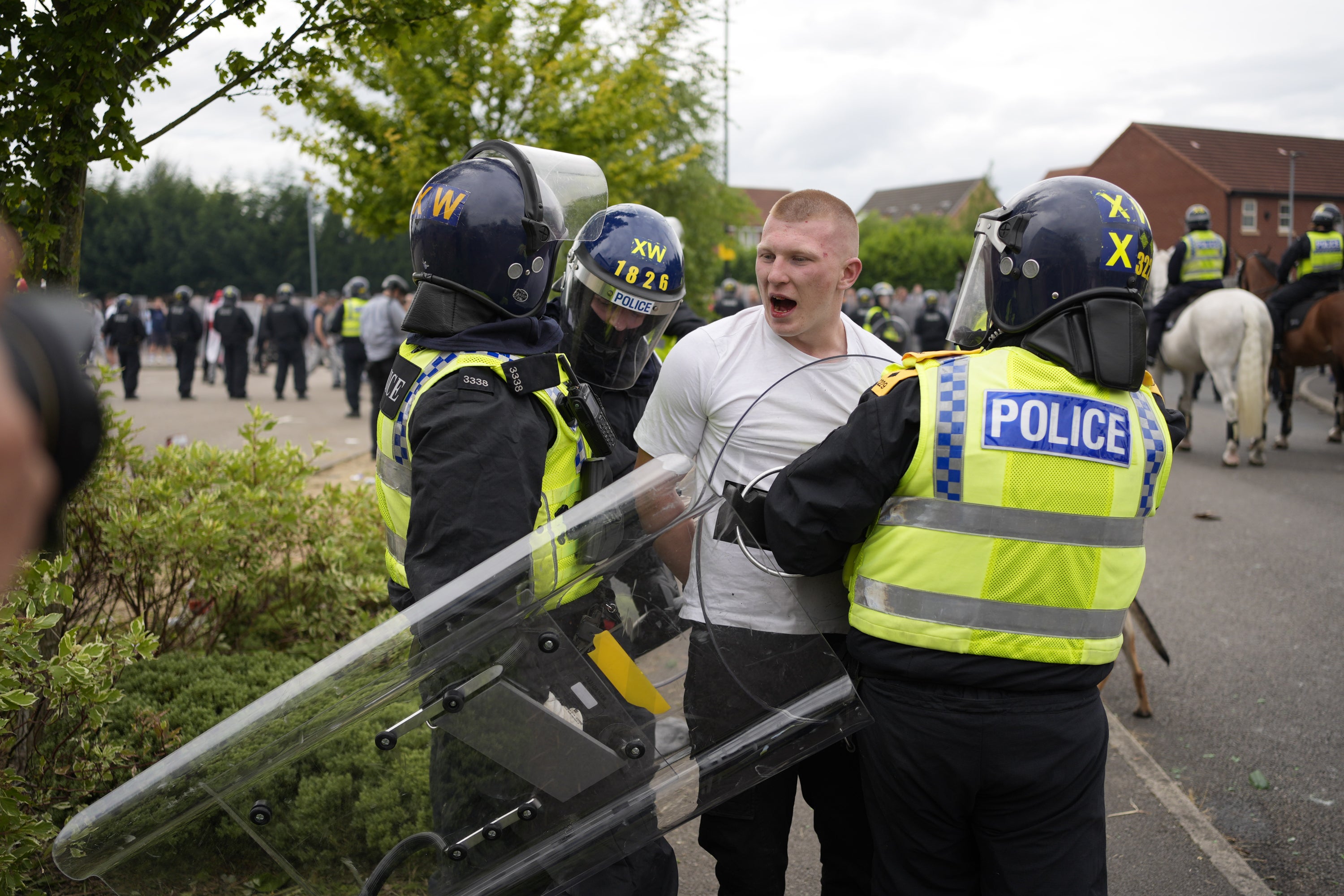We’ve spent 25 years studying the far right – here’s how we deal with them
A shellshocked country rightly asks what’s next. Here, Prof Matthew Feldman and Dr David Tucker lay out the best possible responses to the disorder


At the time of writing, fires continue to burn on our streets. Last night, we braced for another estimated 100 violent clashes between rioters and police, only to be comforted by a wave of peaceful counter-protests.
It has also recently been reported that in Belfast – one of a dozen affected cities – a “member of the public” had attackers “stamp on his head” as members of the public attempted to shield him from further attack. His condition is described as serious and it is being treated as a hate crime. This incident, tragically, is one of many this past week.
A shellshocked country rightly asks what’s next.
Discourse both on and offline has included pontification on social media’s outsized role, from fringe platforms like Telegram becoming veritable “rhinos”; to “big tech” leaders like Elon Musk adding petrol to an already noxious fire – not to mention reinstating people like Tommy Robinson and Andrew Tate to a platform which allows them access to millions.
We could argue that a reckoning is badly needed – but with what? With whom? Who is responsible for the civil unrest – those at the top of society (our politicians), or those at the bottom?
Realistically, the right response to the disorder can only be categorised in terms of short, medium and long-term action. The first is the easiest and most immediate: let the law do its job. Hundreds of arrests and prosecutions are already taking place. Now isn’t the time for reactively blaming the state, sneering at “the mainstream” or at the most vulnerable (the asylum-seeking refugee, for instance, confined to a Holiday Inn hotel room). It is time to reject violence and criminality, wherever it comes from. Pivot to your political agenda later. Right now, we need meaningful, sleeves-rolled-up solidarity.
But we will need a political response, too, in the weeks and months to come. We need to hear more on the practical application of the Online Harms Bill. In case you missed it – and nearly everyone did, back in October 2023 – it’s technically law, now. But there’s been mostly silence from Ofcom and parliament since, in part due to its “implementation” supposedly extending into 2026. And while it does make provision for some of the online-to-offline harms we’re seeing played out on the streets, it seems to me unduly slow – and does not currently appear robust enough to face the scope and scale of challenges revealed this week.
Despite being told by Sir John Saunders at the Manchester Inquiry last year that looking into this response was “a matter of urgency”, the Tories sat on it – and other relevant advice – for (quite literally) years. This must now change. If amendments to the Bill are needed, fine. Just get it done. Right now, about two thirds of us worldwide spend two hours every single day on social media. It’s no surprise that many of the riots were organised there.
Then there’s Britain’s far right. Having studied right-wing extremism for 25 years now, it’s clear to us that the official number of actual British activists is about as small as it has ever been. Yet for the reasons above (the far right has always been an early adopter of new communications technologies), white supremacism in Britain has become perhaps as visible as it has ever been. Yes, the contemporary far right is (in some ways) quite complex. Yet make no mistake: they are racist and vehemently anti-Muslim; political violence is seen as virtue to them.
Over the last decade or so, the far right in Britain today has become – in the words of Dr Joe Mulhall – “post-organisational”. Although few in number, they are gleeful and full of hope, especially right now. Events over the last week have given rise to the impression of the “race war” they’ve been salivating over for decades.
The far right must be put back in its box, as soon as possible. Constructive grassroots activism and political leadership are both urgently needed. Labour has only been in power for five weeks – but hearing from them on what’s happening with the revised Prevent strategy feels essential.
If countering violence and criminality is short term; and tackling (online) influencers and far-right activists medium-term; then the long-term challenge concerns those we might call “sympathisers”. They’re not ideological racists, nor riotous opportunists. Whether dubbed the “left behind”, the “white working class” (or more patronisingly, “reactionaries”), there is a broad reservoir of support in Britain for anti-immigration – even pro-white nativist – sentiment.
Some (but not all) of this sentiment is currently being channelled into the Reform Party, which received 14 per cent of the vote at last month’s general election. It is vital to think about how to reach these disaffected, often angry people and to work out a way of listening to them. We can live better, together.
But how do we have these “difficult discussions”? Online spaces, particularly social media – which is so flexible in accelerating the progress of misinformation and contributing to the rapid mobilisation of groups – could equally prove an important tool to stop violence and hate.
Pratically, it looks like this: Using the sorts of data that advertisers use for marketing; which campaigners use to turn the dial on political persuasions; we’ve shown that intervening in far-right conversations online can be genuinely productive. But it is essential to tread carefully. Getting it wrong can not just prove ineffective, but actively counter-productive. We’ve done the empirical research on this: we’ve found that the more creative our campaigns are, the better they tend to work.
Put differently, if fast-moving online spaces are where opinions are being formed and hardened, shouldn’t we try to take part in some of those conversations, rather than cleaning up the wreckage when events move offline? An “alternative narrative” is really just a different point of view. The problems arise when neither side is prepared to listen to each other.
So let’s get out of our fox-holes – civilly – and have that national debate... properly. That may be painful, but as the great Albert Camus put it: “There is always a philosophy for a lack of courage”. Now is the time for civil courage.
Prof Matthew Feldman is a specialist on right-wing extremism who teaches at the University of York. Dr David Tucker is Director of Academic Consulting Services and Associate Lecturer at the American College of Greece, Athens. His most recent book is A Reply to Hate: Forgiving My Attacker






Join our commenting forum
Join thought-provoking conversations, follow other Independent readers and see their replies
69Comments